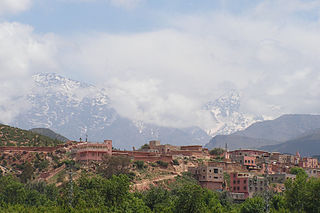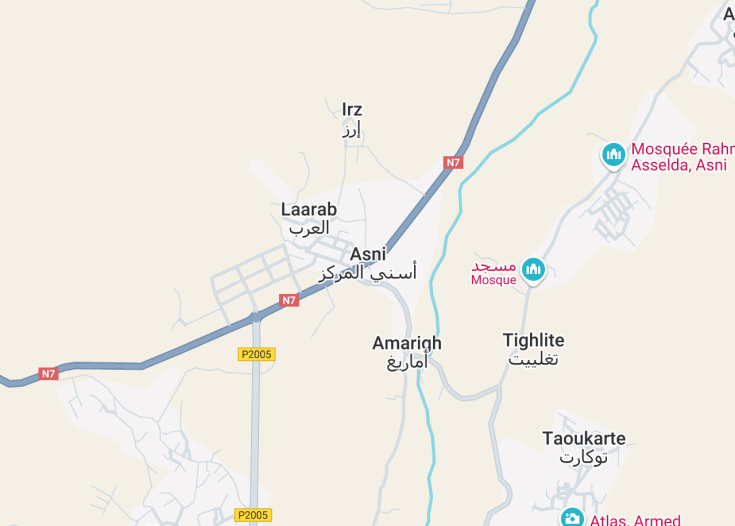Nestled in the foothills of the High Atlas Mountains, Asni in Morocco is a captivating destination that blends natural beauty with rich cultural heritage. This quaint town serves as a gateway to the impressive Toubkal National Park, offering stunning landscapes and a peek into the life of Berber communities. Visitors can explore local markets brimming with crafts and fresh produce or embark on exhilarating treks through verdant valleys and rugged mountain paths, making Asni an ideal spot for adventure seekers and cultural enthusiasts alike.
Pack comfortable hiking shoes and layers, as the mountain terrain around Asni can be quite challenging and weather conditions change rapidly.
Consider visiting Asni on a market day to experience the vibrant local culture and purchase unique handcrafted items directly from the artisans.
Top things to do & see in Asni
Select the following sights and activities to discover best tickets and tours available in Asni.
Asni: A Hidden Gem in the Atlas Mountains
| Country | Morocco |
| Time in Asni | GMT-1 |
| Language spoken | Berber, Moroccan Arabic |
| Population | Approximately 7,500 (Source: Latest Census Data) |
| Currency | Moroccan Dirham (MAD – د.م.) |
| Airports |
|
Asni, situated in the rugged Atlas Mountains in Morocco, is a quaint town rich with culture and history. Despite its small size, Asni plays a pivotal role in the rural life of Moroccans residing in the highlands. Known for its vibrant weekly souk where locals come to trade goods ranging from fruits and spices to handmade textiles, Asni serves as a cultural hub for the surrounding Berber communities. The town is surrounded by picturesque landscapes perfect for trekking and exploring the natural beauty of Morocco’s mountain ranges. It is also a gateway for those adventuring to the Mount Toubkal, North Africa’s highest peak which draws thousands of hikers annually.
Where is Asni?
Asni is nestled in the foothills of the Atlas Mountains of Morocco, less than an hour’s drive south of Marrakech.
Distances:
| Route | Distance by car | Time by car |
|---|---|---|
| Marrakech to Asni | 34 miles (55 km) | 1 hour |
| Taroudant to Asni | 124 miles (200 km) | 3 hours 20 min |
What is Asni famous for?
Asni is renowned for its breathtaking sceneries, traditional Berber architecture, and its proximity to Mount Toubkal, making it a prime destination for trekkers and adventure seekers.
History
Pre-20th Century
The history of Asni, a quaint town nestled in the foothills of the Atlas Mountains in Morocco, stretches back centuries, though precise details about its earliest inhabitants remain somewhat obscure. Historical references suggest the area was inhabited by Berber tribes, who are indigenous to North Africa. These tribes managed to sustain themselves through agriculture, predominantly within the fertile valleys of the Atlas Mountains, long before the arrival of Arab influence in North Africa. The strategic location of Asni on trade routes helped in fostering interactions with other regions, thereby influencing the cultural and social practices of the local inhabitants.
20th Century to Present
With the advent of the French protectorate in Morocco in the early 20th century, Asni saw substantial changes in its socio-economic landscape. The French introduced modern agricultural techniques and improved infrastructure which significantly altered local farming practices and increased accessibility to the town. Post Moroccan independence in 1956, Asni continued to evolve, yet maintained much of its traditional Berber charm. Today, Asni is not only an agricultural hub but also a significant tourist destination, drawing visitors with its authentic rural Moroccan allure and proximity to the majestic Toubkal National Park, the highest peak in North Africa. The town has adapted to the increasing tourism by offering numerous trekking and shopping opportunities that showcase local crafts and produce.
Visit Asni
What to see and do in Asni, Morocco
Visiting Asni offers a unique peek into the traditional Moroccan countryside life along with the natural splendor of the Atlas Mountains. Key attractions include:
- The Saturday Market: A vibrant, bustling market where locals trade everything from fresh produce and spices to handmade crafts and clothing. It’s a colorful opportunity to experience the local culture and commerce.
- Trekking and Hiking: Being close to Toubkal National Park, Asni serves as a starting point for numerous trekking routes. These treks offer spectacular views and encounters with the rugged landscapes of the Atlas Mountains.
- Imlil Village: A short drive from Asni, this village provides further insight into rural Moroccan life amidst stunning mountain scenery.
Festivities in Asni
Asni comes alive with cultural events and festivals, mainly centered around Islamic religious celebrations and seasonal agricultural milestones. Notable among these is the Moussem of Asni, a yearly festival held in the autumn. It celebrates the completion of harvest and includes traditional singing, dancing, and shared community feasts, offering a deep dive into the local customs and communal spirit of Asni.
Best time to visit Asni
The best time to visit Asni is either in the spring (March to May) or autumn (September to November). During these months, the weather is pleasantly mild, ideal for hiking and exploring the outdoors, and you’ll fully enjoy the natural beauty of the region without the harsh summer heat or the cold winter temperatures.
Is Asni worth visiting?
Asni is undoubtedly worth visiting for those who cherish a blend of natural beauty, cultural authenticity, and historical richness. The town offers a unique vantage point into the traditional Berber lifestyle while serving as a gateway to explore the majestic Atlas Mountains. Whether you are an avid trekker looking to scale the peaks of Toubkal or a culture enthusiast eager to explore local markets and festivals, Asni presents a picturesque slice of Morocco that promises both adventure and profound cultural encounters.










